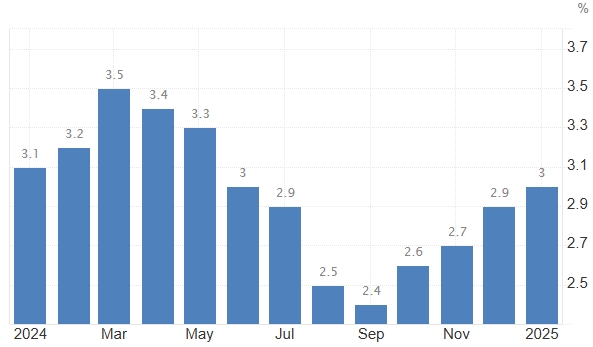US January CPI Surpasses Expectations, 2025 Rate Cuts in Doubt? Trump Might Have a Solution!

TradingKey – The U.S. January CPI results have exceeded expectations across the board, with core CPI growth reaching its highest level in nearly a year. Hopes for rate cuts in the first half of 2025 have been dashed, as Wall Street now speculates that rate cuts—or even hikes—may not occur until the end of the year. However, Trump's policies might pave the way for multiple rate cuts.
On Wednesday, February 12, the U.S. Bureau of Labor Statistics released the January 2025 CPI report:
- The annual CPI rate reached 3%, surpassing the expected 2.9% and the previous 2.9%, marking the fourth consecutive month of increases.
- The monthly CPI stood at 0.5%, the highest since August 2023, exceeding the forecast of 0.3% and the previous 0.4%, continuing a seven-month upward trend.
- The core CPI, excluding volatile food and energy prices, showed an annual rate of 3.3%, above the expected 3.1% and the previous 3.2%.
- The monthly core CPI rate was 0.4%, up from 0.3% and surpassing the forecast of 0.2%.

[U.S. Consumer Price Index (CPI), Source: Trading Economics]
In January, housing costs, which account for about one-third of the CPI, rose by 0.4%, continuing to be a significant driver of inflation. A notable highlight of the report was the increase in grocery prices, particularly the egg index, which surged by 15.2%, marking the largest rise since June 2015.
Overall, the January CPI report exceeded expectations across the board, indicating that the downward trend in inflation remains stalled. Traders have pushed back their expectations for the Fed's first rate cut this year from September to December.
Following the report, U.S. stocks declined, Treasury bonds plummeted, and Treasury yields rose by about 10 basis points, with the 10-year Treasury yield breaking through 4.60% for the first time in half a month.
A Rocky Road to Rate Cuts
Chief economics correspondent for The Wall Street Journal, Nick Timiraos, noted that the strong January inflation data undermines the rationale for the Federal Reserve to adjust its rate-cut trajectory before mid-year.
Goldman Sachs commented that this inflation data could further solidify the Fed's cautious approach to easing. JPMorgan stated that nothing in the CPI report suggests the Fed should cut rates.
Alex Coffey, a strategist at Charles Schwab, warned that doubts are now emerging about whether the Fed will cut rates in the second half of the year, and the next move could even be a rate hike.
Could Trump’s Policies Curb Inflation?
TradingKey analyst Jason Tang stated that both the overall CPI and core CPI exceed market consensus expectations and previous figures, in line with our predictions.
Since hitting a low in September last year, inflation has risen for four consecutive months, indicating a significant resurgence in reflationary pressures in the US. On a month-on-month basis, while energy prices declined, food and core inflation continued to climb. Following the release of the data, market expectations for rate cuts this year were adjusted to just one, with the timing pushed back from mid-year to the second half of the year.
Looking ahead, Tang predicts that, in the short term, as inflation expectations rise, the Trump administration's tariff policies may further drive up US consumer prices. However, from a medium-term perspective, we believe that Trump's energy policies (including increasing oil production and lowering energy prices) will be sufficient to offset the inflationary impact of tariffs, steering both the overall CPI and core CPI back onto a downward trajectory. Therefore, contrary to the market consensus, we anticipate that the Fed may cut rates 2-3 times in 2025.
Additionally, Trump tweeted that interest rates should be lowered, something which would go hand in hand with upcoming tariffs. He referred to the current high inflation as "Biden inflation."







